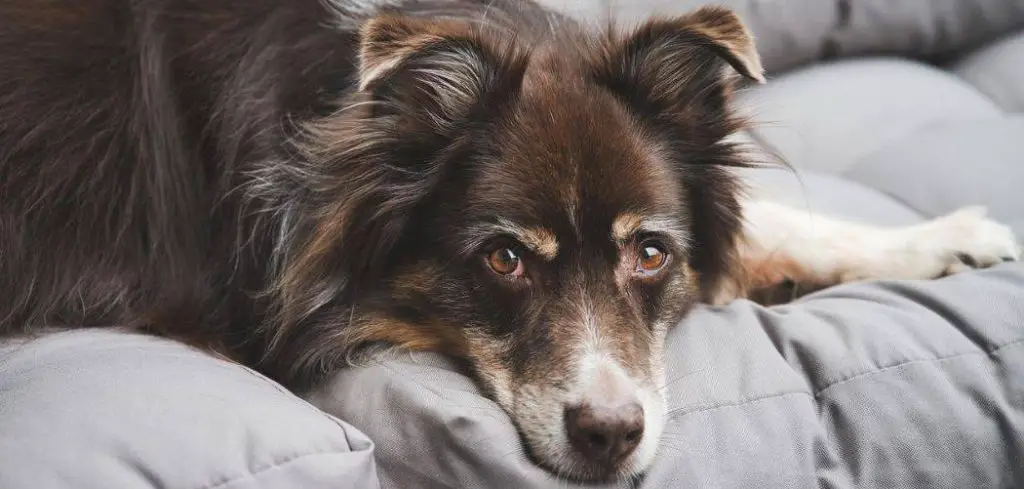When your dog keeps licking their bum and also has diarrhea, it’s a double concern that can’t be ignored. The behavior often points to irritation and it can make your dog very uncomfortable.
We outline the common causes of bum licking and diarrhea in dogs, what you can do at home, and when to seek veterinary help.
Dog Licking Bum Excessively and Diarrhea — Why It Happens
A dog licking its bum excessively while also experiencing diarrhea is often dealing with irritation from anal gland issues, intestinal parasites, dietary problems, or infections. The diarrhea can inflame the anal area, leading to licking, while conditions like worms or allergies may cause both symptoms together. Sometimes the behavior signals pain or discomfort linked to the digestive tract, skin, or glands around the anus.

Dog Licking Bum Excessively and Diarrhea: Common Causes
Anal Gland Problems
Dogs have two anal glands that release a scent when they poop. If they become full, blocked, or infected, dogs may lick excessively to relieve the irritation.
Diarrhea can make it harder for anal glands to empty naturally, causing them to become impacted.
This leads to swelling, scooting, and constant licking around the bum. Infected glands may produce pus or blood and cause significant discomfort.
If untreated, abscesses can form and require urgent veterinary care.
Read more: Dog Excessively Itching but No Fleas (What it could mean)
Intestinal Parasites
Worms such as tapeworms, roundworms, or whipworms can cause both diarrhea and anal irritation.
Tapeworm segments may be visible around the anus, which makes dogs lick or bite at the area. Other parasites inflame the digestive tract, leading to soft stools or watery diarrhea.
Even if you don’t see worms in your dog’s stool, they may still be present. Regular deworming and fecal exams are essential to rule this out.
Dietary Indiscretion or Food Intolerance
Dogs that eat something they shouldn’t—like spoiled food, garbage, or table scraps—often develop diarrhea. The loose stool can irritate the anal area, leading to licking.
Food intolerances or sensitivities to proteins or grains can also cause chronic diarrhea along with itchy, inflamed skin around the bum. Dogs may lick excessively to relieve the irritation, even when nothing obvious appears on the skin.
Bacterial or Viral Infections
Infections in the gastrointestinal tract, such as salmonella or parvovirus, can cause severe diarrhea and discomfort.
While parvovirus is more common in unvaccinated puppies, bacterial infections can affect dogs of any age. The constant passing of watery stool irritates the anal area, which leads to licking and scooting.
Infections are often accompanied by lethargy, loss of appetite, or fever. Veterinary care is critical if symptoms are severe or persistent.
Allergies
Allergies don’t just cause skin itching—they can also trigger gastrointestinal upset.
Food allergies are a major cause of diarrhea in dogs, and the irritation they cause often extends to the anal area. Dogs may lick their bum excessively after passing loose stools, trying to soothe the discomfort.
Environmental allergies, such as pollen or dust mites, can also inflame the skin around the anal area, compounding the problem.
Stress and Anxiety
Stress can upset a dog’s digestive system, leading to loose stools or diarrhea.
At the same time, some anxious dogs develop excessive grooming behaviors, which may include licking the bum. The combination can make owners think only of physical causes, but stress should also be considered.
Major changes in routine, new pets, or loud environments can all contribute to stress-related symptoms.
What to Do If Your Dog Is Licking Their Bum Excessively and Has Diarrhea
If your dog is licking their bum and also dealing with diarrhea, start by keeping the area clean. Use a damp cloth or pet-safe wipes to gently clean the fur and skin around the anus, reducing irritation.
Offer a bland diet such as boiled chicken and rice for 24–48 hours if the diarrhea is mild and your dog is otherwise acting normal. This can give the digestive system time to settle.
Make sure your dog has constant access to fresh water, since diarrhea can quickly lead to dehydration. You may also offer an electrolyte solution made for pets.
Monitor your dog closely for signs of worms, blood in the stool, or worsening symptoms. If your dog is scooting, licking constantly, or straining to poop, anal gland issues may be involved and require a vet’s help.
When to Call or Visit Your Vet
You should call your vet if the diarrhea lasts more than 24–48 hours, especially if it is watery, contains blood, or is accompanied by vomiting.
Seek veterinary help immediately if your dog appears weak, lethargic, or refuses to eat or drink. These are signs of dehydration or systemic illness that need urgent attention.
If your dog is scooting, has swelling or redness near the anus, or is crying when trying to poop, anal gland problems or infections may be the cause. These require professional treatment.
Puppies, senior dogs, and dogs with existing health issues should see a vet sooner rather than later, since they are more vulnerable to complications from diarrhea and infections.
Read more: Dog Excessively Licking Bottom of Paw (When it’s a concern)
Key Takeaway
A dog licking its bum excessively while also experiencing diarrhea is usually trying to relieve discomfort caused by anal glands, parasites, diet problems, infections, or allergies.
While mild cases may improve with home care, persistent or severe symptoms require veterinary help.
By paying close attention to both the licking behavior and the digestive upset, you can help your dog get the right treatment and return to feeling comfortable and healthy again.
